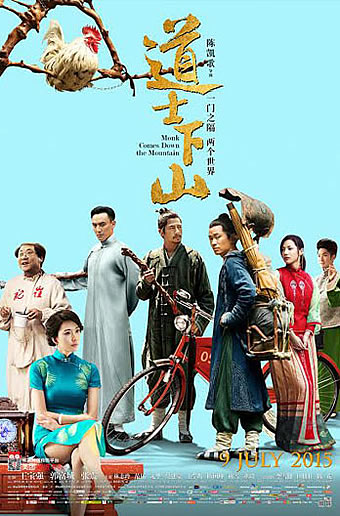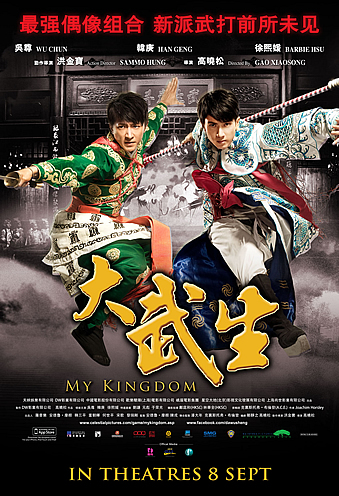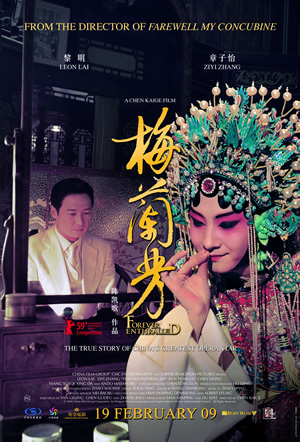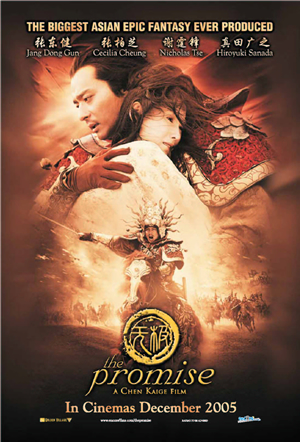MONK COMES DOWN THE MOUNTAIN (道士下山) (2015)
Genre: Martial-Arts/Drama
Director: Chen Kaige
Cast: Wang Baoqiang, Aaron Kwok, Chang Chen, Chiling Lin, Fan Wei, Yuen Wah, Wang Xueqi, Vanness Wu, Chen Kwok Kuen, Lam Suet, Jaycee Chan
Runtime: 2 hrs 3 mins
Rating: PG13 (Some Violence)
Released By: Sony Pictures Releasing International
Official Website:
Opening Day: 7 July 2015
Synopsis: An impoverished young monk, who has spent his entire life in a monastery located on top of a mountain, is forced to encounter the real world when he travels down the mountain for the first time. He encounters "Jianghu" (the world of various sects of martial arts), along with a series of bizarre events and extraordinary, larger-than-life characters. These occurrences bring him closer to understanding the meaning of life and the true essence of martial arts. He discovers that "Ruthlessness defines a champion, principle creates a hero," finally understanding the lesson his master was trying to impart.
Movie Review:
Whereas it is often the world-weary individual who finds solace and enlightenment from his sins and other worldly burdens by journeying up the mountain, Chen Kaige’s latest sees his protagonist do quite the opposite. Raised as a baby in a monastery after he was found on its steps as a child, the ingenuous He Anxia (Wang Baoqiang) – so named after the abbot’s dilemma of “where to put” the child – is sent down the mountain after he wins a martial arts tournament that the abbot holds to determine who should leave in the wake of a food shortage. “You’ll meet good and bad people,” the abbot intones. “But a hero stays true to himself.” And with these words of wisdom, Anxia journeys to the city of Hangzhou in the 1930s to make his own livelihood.
As scripted by Chen and Zhang Ting from Xu Haofeng’s popular martial arts novel of the same name, Anxia’s rite of passage consists of three loosely related acts that depict life’s vicissitudes. The first act revolves around a surgeon named Tsui Daoning (Fan Wei) who becomes Anxia’s benefactor after he offers to give him shelter and employment at his clinic. Turns out that Daoning used to be a monk as well, but he left the monkhood in order to marry his porcelain-beauty wife Yuzhen (Lin Chiling), whom Anxia is shocked one day to catch cheating with Daoning’s no-good younger brother Daorong (Vanness Wu). Enraged at their betrayal and complicity in Daoning’s subsequent sudden death, Anxia takes matters into his own hands, which only plunges him further into despair.
But this will only be the first test of the strength of his character, and no sooner has he purged the guilt of his actions with the help of a Buddhist monk Rusong (Wang Xueqi) is he drawn into his next trial. While at Daoning’s clinic one day, Anxia meets Zhao Xinchuan (Danny Chan) who reveals that he wants to buy some medicine for his master Peng Qianwu (Yuen Wah) whom he will be duelling with that evening. Xinchuan wins the duel, but the manipulative Qianwu literally stabs his disciple from the back at the end, whose death in turns brings Qianwu’s son Qizi (Jaycee Chan) to Anxia’s clinic for answers. In what turns out to be more than just a coincidence, Qizi leads Anxia to raid Zhou Xinyu’s (Aaron Kwok) temple kitty, who happens to be a longtime rival of his father Qianwu.
Unlike with Daoning, Anxia is pretty much an observer to their longstanding feud, but even then he is just as distressed at the fate that ultimately befalls Xinyu. Thus begins the third act led by Boss Cha (Chang Chen), a Chinese opera doyen who is just as distraught to hear about Xinyu and who makes it his personal mission to avenge Xinyu. Yes, the two go way back, and if you’ve read the Chinese tabloids, you may have come across some referring to their relationship as bordering on homo-erotic (and really, who can blame them when you have two oh-so-good-looking leads oozing machismo at each other?). Besides Cha, this last act also adds Lam Suet’s corrupt police commissioner, whom Cha offends by cancelling his show on the very evening that the former books the entire theatre to celebrate his concubine’s birthday.
Kindness. Love. Lust. Betrayal. Vengeance. Hatred. Through Anxia’s encounters with these worldly characters, Chen invites his audience to ruminate on what we have come to accept as the natural order of life, where one thing leads to another for better and for worse. As Anxia witnesses these characters go about this order, he is forced – and we are similarly confronted – with the decision to simply accept this vicious cycle of anger and violence or to be courageous enough to break it. Indeed, everything unfolds as a series of cause and effect, which underlies the Buddhist concept of karma that Anxia will learn by the final showdown between Qianwu and Cha, as well as between Qizi and Anxia.
Chen’s films have always been known for their social undertones, but his latest reflects a sort of coming-of-age for the filmmaker, who uses his signature visual flair and epic storytelling for a much more introspective picture. Though Anxia starts off as an observer to the events around him, he quickly becomes an actor in his own right, whose actions in turn have repercussions on others around him. So it is for each one of the other characters, whose actions in turn are responsible for their own fates and that of those around them, and Anxia’s coming-of-age journey is in appreciating the way the world turns, in order to better appreciate how and why the Buddhist teachings that are meant to be antithesis to this worldly order.
Thankfully, Chen isn’t didactic; in fact, he keeps the tone light, graceful and even poetic. The same can also be said of Ko Huen Chiu’s action choreography, i.e. as poetry in motion, with some sumptuous set-pieces such as Xinyu’s one-on-one duel with Qianwu, Cha’s one-against-many with the commissioner’s henchmen, and of course the gorgeous finale that literally takes place on a different plane altogether. The execution is like a martial-arts graphic novel come alive, and quite spectacular to behold. Chen hasn’t let go of his touch for the fantastical from his last film ‘The Promise’, but the
CGI embellishments enhance, rather than detract, from the fable-like storytelling.
Chen also has his ensemble cast to thank for elevating the material. Fresh off his stint as a crazed serial murderer in ‘Kung Fu Killer’, Wang exhibits surprising depth as the titular monk way out of his depth. It isn’t the first time he’s playing the artless idiot, but Wang displays a much wider breath of emotions than we’ve ever seen him do in a single role. Kwok has proven himself an actor in his own right, and brings gravitas to the role of a world-weary Tai Chi master who has chosen seclusion away from the worries of the world. But among the supporting cast, it is Chang Chen who will leave the deepest impression, all charm, elegance and grit on his quest for justice and finally putting that kung fu training from ‘The Grandmasters’ to good use.
And oh for those curious to know just how much of a role Jaycee Chan is left with, we can safely say that he has survived it pretty much intact. It is a supporting part no doubt, but an unexpectedly pivotal one as the story unfolds. But ‘Monk Comes Down the Mountain’ deserves to be recognised for so much more than Jaycee’s (likely) last Mainland film in a while; it is, somewhat ironically, a meditation on the way of the world, the good, the bad and the downright ugly, and a poignant reminder that there is no escaping the viccissitudes of love, hate and desire.
Movie Rating:




(Whimsical, elegant, gorgeous, and poetic, Chen Kaige’s meditation on the way of the world through the eyes of a guileless Taoist monk is a deeply moving coming-of-age story)
Review by Gabriel Chong
You might also like:

Movie Stills







